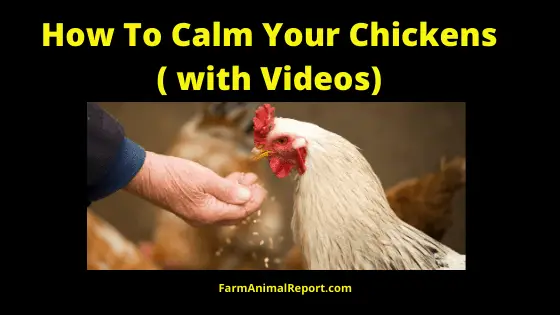Calming Your Chicken
Author: Dr. John Abbass
DVM M. Phil
As a general rule Stress is the main factor that badly impacts the health and overall well-being of animals. Just like humans, stress creates many complications and is not desirable for animals too. Chickens are also prone to stressful conditions and show a variety of responses. Reasons 1)Environmental stress (extreme weather conditions) 2) Nutritional stress (due to anti-nutritional factors, mycotoxins, etc)
3) Technological/management stress (poor housing and other management protocols)
4) Internal stress (due to any internal disease, abnormality)
How to Calm Your Chicken Effective Techniques
How to Calm Your Chicken – Stress is the main factor that badly impacts the health and overall well-being of animals. Just like humans, stress creates many complications and is not desirable for animals too. Chickens are also prone to stressful conditions and show a variety of responses. Reasons
Chickens are thought to be considered as ‘Coward birds’ by nature. They are very susceptible to many kinds of stress. Due to stressful conditions, they show decreased growth and stay depressed.
This is a very important thing for chicken owners to know, how they can minimize stress levels in their beloved chickens to ensure a healthy and stress-free rearing environment for them.
Here, we will throw some light on a few practically implementable strategies to minimize and manage stress and calm down chickens in an effective way.
4 Types of Stress in Chickens
Stress is also called a ‘silent killer in birds.
The factors which interfere with the well-being of the bird are called stressors or stress factors, and the result of the response or the effort that costs the chicken while trying to cope with the stressor is what constitutes stress.
Check Out Amazon for Educational Resources for Breeding Chickens
12 Ways to Make Money by Chicken Farming—Extensive Guidelines for Chicken Farmers
There are some important types of stress, which chicken owners must know to opt for an efficient strategy to manage them.
1) Environmental stress (extreme weather conditions)
2) Nutritional stress (due to anti-nutritional factors, mycotoxins, etc)
3) Technological/management stress (poor housing and other management protocols)
4) Internal stress (due to any internal disease, abnormality)
Poor management of a flock will also cause stress, in addition to changes in the weather and seasonal patterns. It is essential to establish a positive routine for your chickens that benefits their health and removes elements that might cause poultry stress.
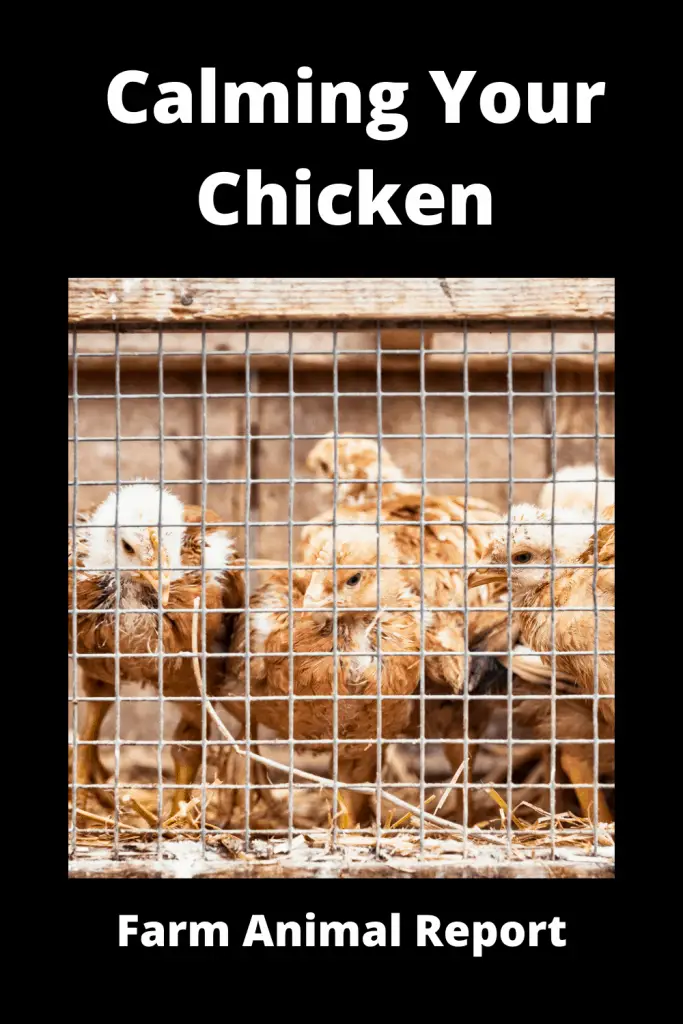
9 Symptoms of Stress in Chickens
Here are a few key signs, which can be helpful to evaluate any stressful situation in chickens
1) Chickens will show anorexia (loss or decreased appetite)
2) Poor feed conversion
3) Decreased production and dullness
4) Increased mortality rate
5) Growth stagnation
6) The increased cost of production
7) Chickens become prone to other diseases and sickness
8) Increase heart rate/breathing
9) Panting in case of heat stress, that is common in chickens.
How To Calm a Stressed Chicken
Owners love to see their chickens happy and stress-free. There are many things that can help you handle the stress of birds and make them calm. Let’s have a sharp look at them.
Remember, chickens cannot afford the feelings of being confined or vulnerable. Usually, when chickens are being held and struggling hard, it’s because they might be tilted at an unnatural angle or held too tightly. Unfortunately, a struggling chicken often makes a handler grip on even tighter, exacerbating the problem.
It is noteworthy that you need to gain the trust of your chicken by handling it in a gentle way. The more you mishandle them, or handle them roughly, the more you lose their trust in you. Eventually, they will start becoming stressed by your simple presence. Don’t forget that more stress leads to a greater susceptibility of diseases.
Coming to the point, it is better to spend time, and feeding them will help you to create a bond with them that will be beneficial to make them stress-free from your presence.
Remember – Better management Stress-free birds
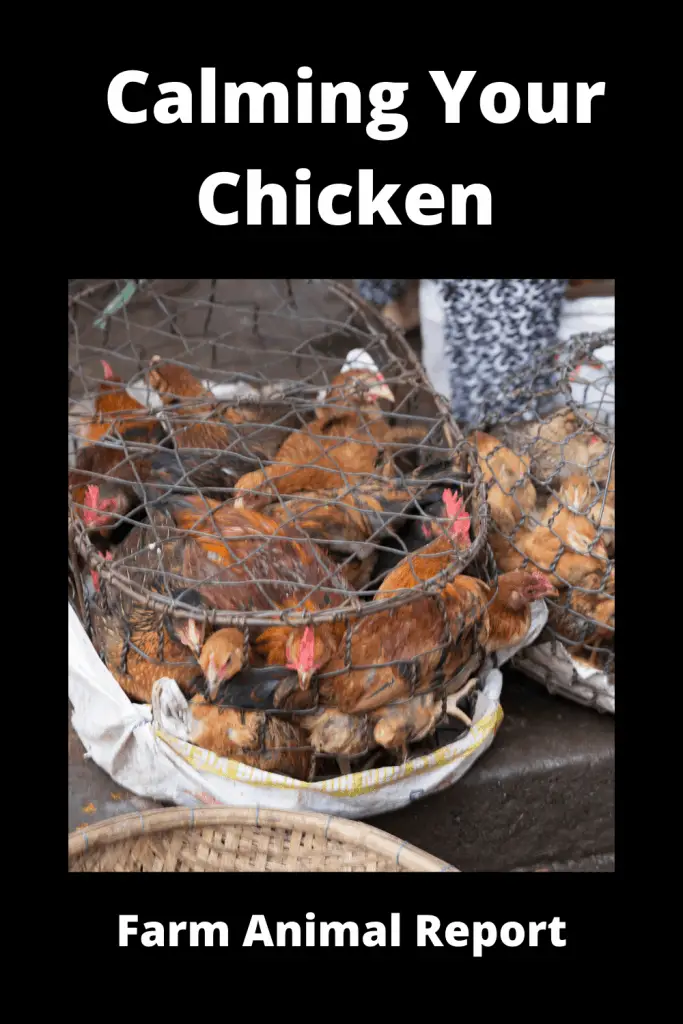
Safe Environment
Providing chickens with a secure and safe living environment is a key factor to reduce stress and making them calm. Their environment must be safe and free from the threat of predators. Any predator attack can lead to a great surge of stress in the whole flock, and just like humans, It Might Take a lot of time for the chickens to become calm again.
Along with the needed time, also provide them with plenty of freshwaters.
Introducing New Chickens Into Your Flock
Another very stressful condition can be the introduction of any new chicken into the pre-existing flock. This thing can put chickens into the danger of getting stressed.
This is important to be mindful of the ages of the newly introduced chickens. And the ones that are currently in the flock. At times, younger chickens experience some problems, if they’re in a flock with older ones, and need to be fully grown before being incorporated into the flock. They can be pecked and attacked if they are too young.
Put the new chickens into the same run, coop, as the original flock – but separate them with wire mesh or some other material. It’s a less confrontational way of getting the chickens used to one another. Do this for about a week before taking the guard away. This thing will help them get calm.
How Boredom Causes Stress in Chicken Flocks
A very important thing to be remembered is the boredom that exposes your chickens to stress. If your chickens are finding their daily lives on a very bland side, then they will become annoyed and depressed. Due to this, they start developing bad habits such as pecking and other undesirable behaviors
There are many ways to keep them happy and relaxed such as –
- Chicken Toys
- Chicken Pinatas
- Adding Hay for them to take away from each other
- A Hanging Cabbage
In addition to that, researchers have documented that placing lavender in their coop or place can help them get calm and relaxed.
This is a brilliant; stress-relieving herb that can be placed in the nest boxes of chickens and gives uncountable stress-removing benefits from the flock. This all comes under the umbrella of Aromatherapy.
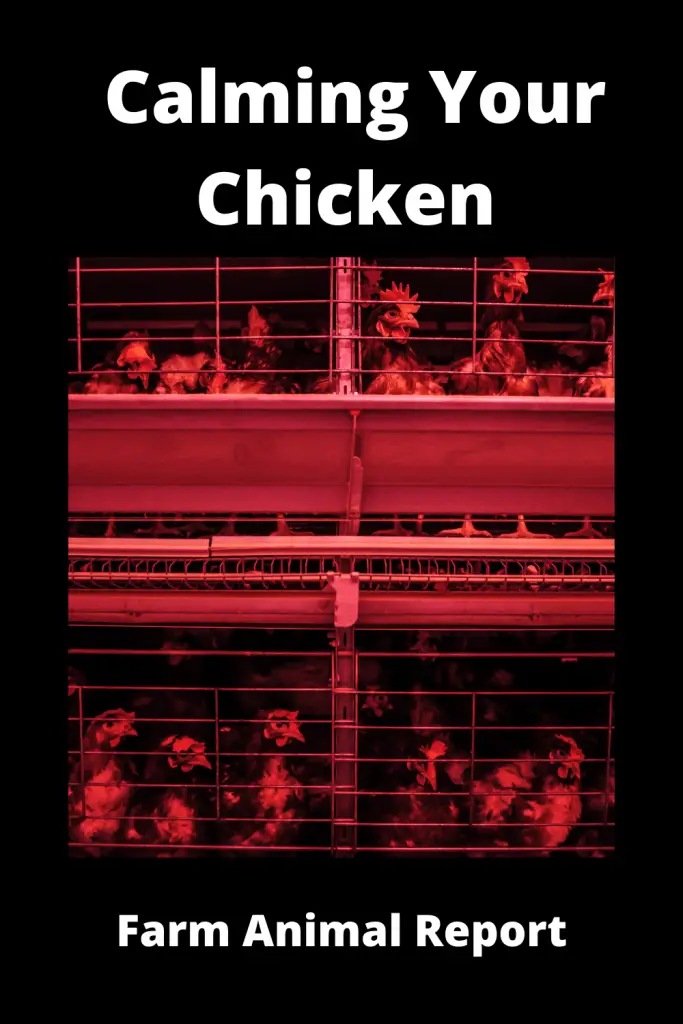
Availability of a Good Diet
There are many feed formulas that are being used in chicken feeds. Being a chicken owner you must have sufficient knowledge about stress-reducing supplements and diets. Remember, vitamin C has anti-stress properties and must be included in the diet of chickens.
Along with that, you should provide a healthy and nutritious diet with the best supplement formulations. This all will aid in proper digestion and utilization of feed which in return, will boost up the immunity and reduce disease burden and stress.
Supreme quality feed and a humane environment both are key factors that can help to decrease stress and make your chicken calm and happy to a greater extent.
Treatment of Insect Infestation or Disease
It is important for you to look for any insect infestation, exclusively mite infestation which makes them stressed and lethargic. It is better for you to identify the infestation or any other disease burden as soon as possible. Also, go for a better care and treatment strategy to calm them from this filthy suffering.
Other procedures such as trimming beaks and toenails is an essential part of poultry keeping, but it can also be a stressful one for the birds. General grooming, plucking, nail trimming, and other treatments are all stressful and need carrying out with care.
Never hold the birds upside down
this may cause respiratory issues in them. Plus, always be as quick and gentle as possible when carrying out routine grooming and manicure tasks. A brilliant tip is to wrap the bird safely in a towel to prevent the wings from being able to flap.
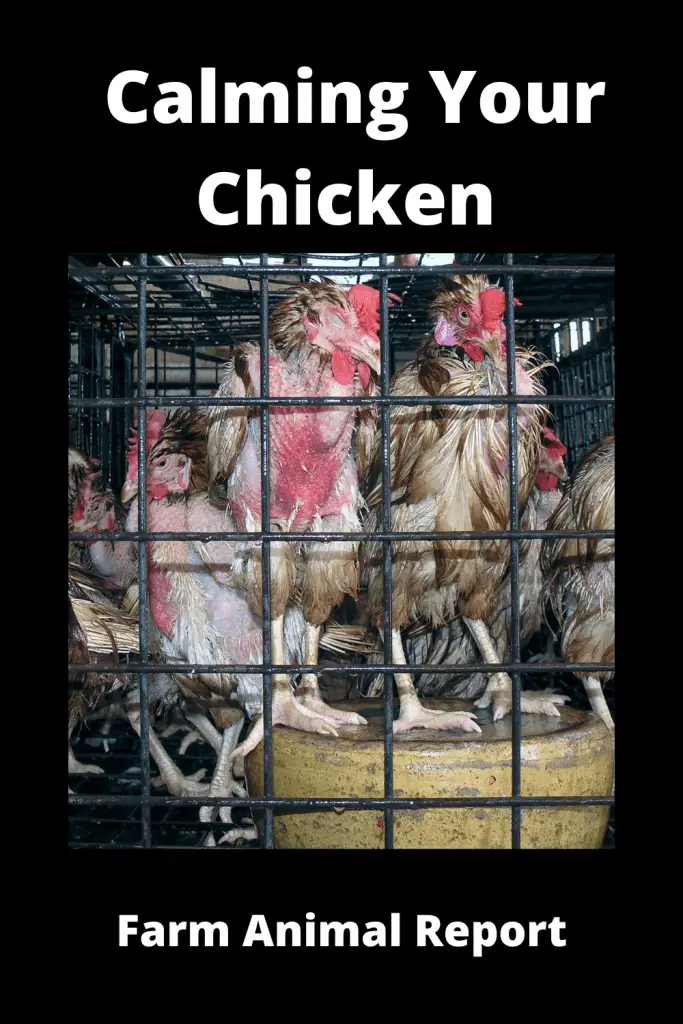
Tips
Being chicken owners, it is necessary for you to keep an eye on the overall behavior and signs and symptoms to get an idea of whether your chickens are in stress or not. It is important to quickly recognize signs of stress, like abnormal feathering, constant preening of feathers even in the absence of external parasites, increased aggression like feather pecking or cannibalism, and even aimless and restless pacing of birds that are housed on the floor.
If Chickens are delayed in laying eggs is also an indication since birds under stress are believed to hold their eggs longer in the shell gland. It is also suggested that colored egg-laying birds under stress begin to lay eggs with pale-colored shells. The hatchability of these eggs is also lower when compared to normal colored eggs.
While the priority of poultry farming is the business consideration, we have the obligation of balancing it with humane methods of achieving it. Animal welfare in many countries is controlled by legislation that protects animals and birds from being subjected to unnecessary pain or distress.
Even where we are not bound by law, without sounding sentimental, we owe our birds the quality of handling and care which they deserve for serving our business ends. Besides, everyone knows that the performance of chickens, like all living beings, is directly proportional to a reasonable level of their well-being and comfort. As long as we stay ignorant or insensitive to any form of hardship that birds go through, stress will continue to remain a silent killer.
These all-important considerations can be beneficial for you to create a stress-free rearing regime for your chickens and calm them with better efficiency if you find your chicken under any stress pressure. Minimize all kinds of environmental, predator and breeding stresses to a greater limit, if possible. These things will put a positive impact on them.
Chicken / Poultry Breeder Associations
| Rabbit Association | Location | Link |
|---|---|---|
| US Poultry & Egg Association | United States | USPA |
| American Poultry Association | California | APA |
| Ohio Poultry Association | Ohio | OPA |
| National Chicken Council | United States | NCC |
| British Poultry Council | United Kingdom | BPCE |
| Poultry Club of Great Britain | United Kingdom | PCGB |
| Association of Poultry Breeders in EU | Europe | AVEC |
| Australian Chicken Meat Federation Inc | Australia | ACMF |
| Australian Poultry Hub | Australia | Poultry Hub |
REFERENCES
Dhal S.K., Misra S.C.,
Misra P.K., Dehuri P.K., Mohapatra M. and Misra M.S. (1997). Study on the
extent of protection by ‘Zeetress’ against heat stress on the growth of broiler
birds. Indian J. Indigenous Med. 19, 75-77
Pande,C.B. (2002): Herbal formulation as a promising Fadaptogenic, antistress
and immunomodulator – A review. Poultry Fortune, 4(6): 32-35.
PuvadolpirodS. and Thaxton J.P. (2000). Model of physiological stress in
chicken I. response parameters. Poult.
Sci. 79, 363-369.
Rajmane B.V. (1996). Effect of stresroak in stress condition on broiler performance. Biotechnologija Yogoslavi stocarstvu. 215-218
Rizk H.T., Al-Lateif, Abdallah A.E.A. and Ahmed M.M. (2003). Effects of Yucca Schidigera extract on immune parameters of ammonia stressed broiler chickens. Vet. Med. J. Giza. 51, 213-221.


